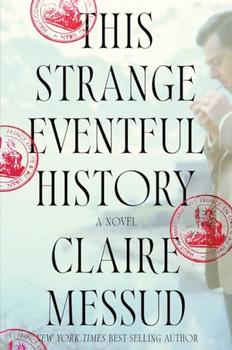Page 3 of 3
There are currently 21 member reviews
for This Strange Eventful History
-
Catharine L. (Petoskey, MI)
This Strange Eventual History
4.5. The Cassars lived in Algeria from 1940 to 2010. They thought of themselves as 100 belonging there and 100 French citizens. Yet when Algeria became independent, they had to leave -not wanted in Algeria or France.
This is a story about a family, without roots, moving from country to country. Gaston and Lucienne, the parents, who have the perfect marriage, and their children, Francoise and Denise, who can never achieve this perfection. Based on the lives of the author's own family, the novel brings alive the thoughts, emotions, and desires of these individuals. I felt I really knew these people and cared about their lives.
I knew nothing about Algeria and would have liked to know more about their lives there.
-
Randi H. (Bronx, NY)
A moving tale of loss
Covering a span of 70 years, This Strange Eventful History tells the story of a family as they search for home. Uprooted from their lives for reasons as varied as war, love, and career, the Cassare family struggles to be happy where they land.
I was drawn to the moving depictions of the primary characters as they struggled with their relationships to their homes and one another. And I enjoyed the varied locations across the globe as the family moved around, including Algeria, Australia, and Argentina. I think anyone who appreciates a sweeping family saga would enjoy this book.
-
Julie M. (Coon Rapids, MN)
Multi- Generational Story
I usually love a family drama that stretches over several generations, but this one left me cold. Even knowing some of these events were from Messud's life couldn't keep me focused or invested in the Cassie family.
-
Joshua M. (westfield, NJ)
An Unmoored Clan
This Strange Eventful History is the latest novel to find a place on Claire Messud's crammed bookshelf. Strange/History follows generations of the Cassar clan, as its members — each lugging a steamer trunk of personal shortcomings — roam the world unmoored seeking to live a fulfilling life. Messud packs the four hundred plus pages with literary sentences/paragraphs that initially prove engaging but become tiresome, forcing the reader on unnecessary detours down story side streets.
The main characters are well developed and evolve nicely throughout the chapters, but none of them elicit empathy and that proved to be a problem. I simply didn't care what happened to them. As a result, when I got to page 257 I asked myself why should I continue reading. I didn't.
-
Vicki O. (Studio Citu, CA)
Not for me
I loved Claire Messud's other books but not this one. This is a very slow moving family saga. I found that the fine storytelling got lost or bogged down in description minutia. As a result, i lost interest in the characters and the narrative. I know that much of the story is based on Messud's life and i wonder if it would have been better as a memoir.
-
Doris K. (Mountain Iron, MN)
This Strange Eventual History
This book was very hard for me to continue reading but I did finish it. The main themes seemed to be unhappy lives, dementia, illness and death. It covers a long period of time and many people which make it difficult to relate to individuals. A strong family theme is portrayed often with love but negative consequences.
The strong point of this novel is the excellent writing by Claire Messud. Descriptions of people and geographical areas are outstanding. For this reason I plan to read another of her books.
-
Patricia L. (Seward, AK)
More strange than eventful
Messud's novel follows the Cassars, a family of Pied-Noir, from 1940 to the 2000's. Wikipedia describes Pied-Noirs as "…an ethno-cultural group of people of French and other European descent who were born in Algeria during the period of French rule from 1830 to 1962." Most Pied-Noirs were aligned with the French. Consequently, when Algeria won independence from France, many migrated away from their birthplace permanently. Messud states the work is fiction yet follows her family's experience.
All of the above sets the stage for wonderful historical fiction. Yet Messud treats the history as secondary to the family drama, resulting in numerous trips to Wikipedia. Constantly searching for timelines of events, explanations of literary references and verification of names dropped made reading laborious.
Constantly inside the heads of her characters and their sordid lives, Messud is both pleasantly descriptive yet wordy. She spent a whole page describing one of the many self-absorbed characters, Francois, stealing a forbidden drink while feeding peanuts to his dog. Yet the story did not move forward. Spontaneous announcements of the future fate of her characters felt like plot spoilers. More reality tv than historical fiction.
This novel is recommended for those who have time and resources to study the history of Algeria and its people along with a crash course in family dysfunction before reading the novel. Others may want to spend their valuable reading time with something less strange and more eventful.




